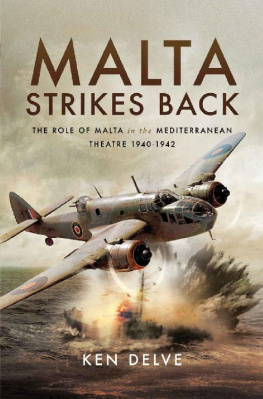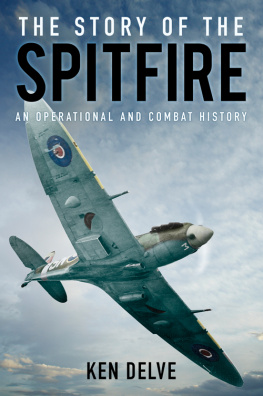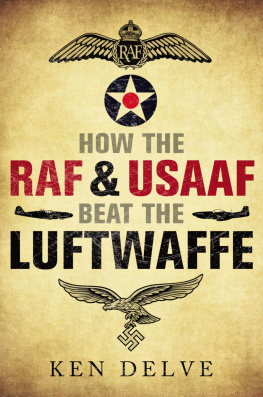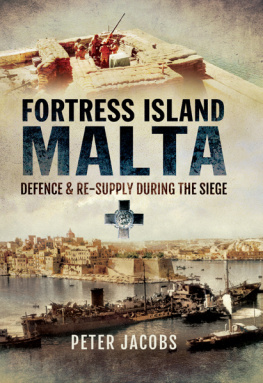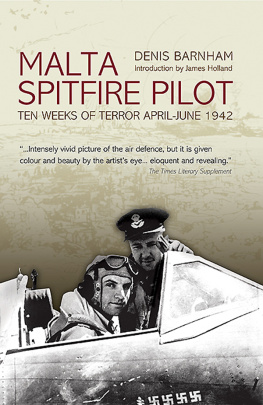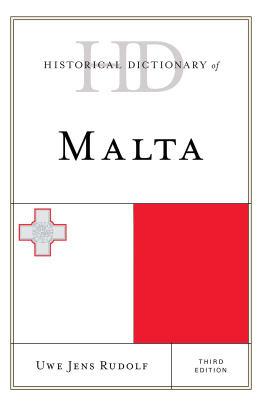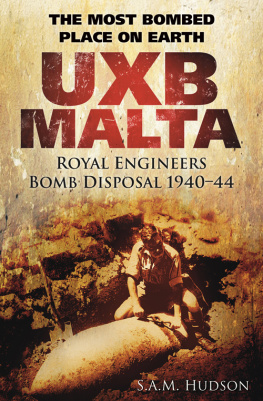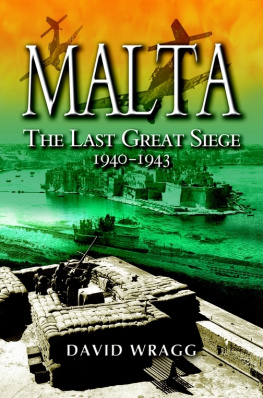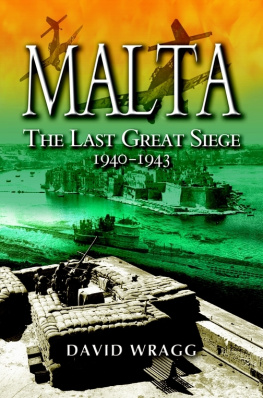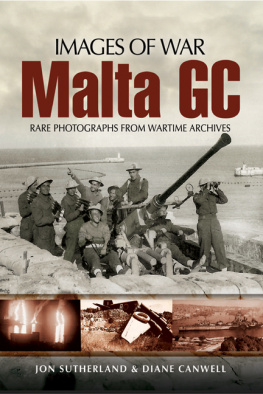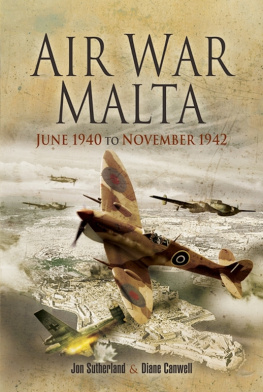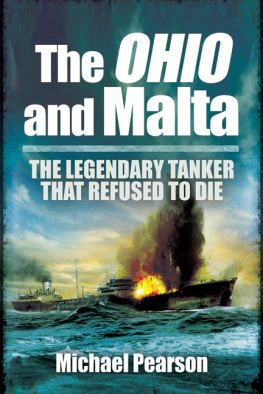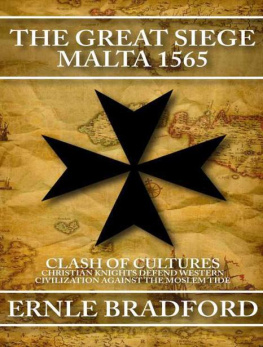Ken Delve - Malta Strikes Back: The Role of Malta in the Mediterranean Theatre 1940-1942
Here you can read online Ken Delve - Malta Strikes Back: The Role of Malta in the Mediterranean Theatre 1940-1942 full text of the book (entire story) in english for free. Download pdf and epub, get meaning, cover and reviews about this ebook. year: 2017, publisher: Pen and Sword, genre: Non-fiction. Description of the work, (preface) as well as reviews are available. Best literature library LitArk.com created for fans of good reading and offers a wide selection of genres:
Romance novel
Science fiction
Adventure
Detective
Science
History
Home and family
Prose
Art
Politics
Computer
Non-fiction
Religion
Business
Children
Humor
Choose a favorite category and find really read worthwhile books. Enjoy immersion in the world of imagination, feel the emotions of the characters or learn something new for yourself, make an fascinating discovery.
- Book:Malta Strikes Back: The Role of Malta in the Mediterranean Theatre 1940-1942
- Author:
- Publisher:Pen and Sword
- Genre:
- Year:2017
- Rating:3 / 5
- Favourites:Add to favourites
- Your mark:
- 60
- 1
- 2
- 3
- 4
- 5
Malta Strikes Back: The Role of Malta in the Mediterranean Theatre 1940-1942: summary, description and annotation
We offer to read an annotation, description, summary or preface (depends on what the author of the book "Malta Strikes Back: The Role of Malta in the Mediterranean Theatre 1940-1942" wrote himself). If you haven't found the necessary information about the book — write in the comments, we will try to find it.
Ken Delve: author's other books
Who wrote Malta Strikes Back: The Role of Malta in the Mediterranean Theatre 1940-1942? Find out the surname, the name of the author of the book and a list of all author's works by series.
Malta Strikes Back: The Role of Malta in the Mediterranean Theatre 1940-1942 — read online for free the complete book (whole text) full work
Below is the text of the book, divided by pages. System saving the place of the last page read, allows you to conveniently read the book "Malta Strikes Back: The Role of Malta in the Mediterranean Theatre 1940-1942" online for free, without having to search again every time where you left off. Put a bookmark, and you can go to the page where you finished reading at any time.
Font size:
Interval:
Bookmark:
Malta Strikes Back
The Role of Malta in the Mediterranean Theatre 19401942
Ken Delve

First published in Great Britain in 2017 by
Pen & Sword Aviation
an imprint of
Pen & Sword Books Ltd
47 Church Street
Barnsley
South Yorkshire
S70 2AS
Copyright Ken Delve 2017
ISBN 978 1 47389 244 6
eISBN 978 1 47389 246 0
Mobi ISBN 978 1 47389 245 3
The right of Ken Delve to be identified as the Author of this Work has been asserted by him in accordance with the Copyright, Designs and Patents Act 1988.
A CIP catalogue record for this book is available from the British Library
All rights reserved. No part of this book may be reproduced or transmitted in any form or by any means, electronic or mechanical including photocopying, recording or by any information storage and retrieval system, without permission from the Publisher in writing.
Pen & Sword Books Ltd incorporates the imprints of Pen & Sword Archaeology, Atlas, Aviation, Battleground, Discovery, Family History, History, Maritime, Military, Naval, Politics, Railways, Select, Transport, True Crime, and Fiction, Frontline Books, Leo Cooper, Praetorian Press, Seaforth Publishing and Wharncliffe.
For a complete list of Pen & Sword titles please contact
PEN & SWORD BOOKS LIMITED
47 Church Street, Barnsley, South Yorkshire, S70 2AS, England
E-mail:
Website: www.pen-and-sword.co.uk
T he Mediterranean was the key to success or failure in the land campaigns in countries around its borders, a fact that was as true in the Second World War as it had been for Ancient Rome and her enemies, for the medieval kingdoms (and the Crusades), and for Napoleon and his attempts to stifle Britains commerce. Two of the greatest strategic mistakes by Hitler concerned his failure to take control of two key locations, Gibraltar and Malta; between them they were able to influence and, at times, dominate the western Mediterranean area and the surrounding land masses. Malta, with its strategic partner Alexandria (and Egypt), likewise dominated the eastern Mediterranean and surrounding land masses. Nowhere in the Mediterranean was more than 200 miles from land and so land-based aircraft could always be a deciding factor for the side that controlled the land bases.
The Maltese group of islands are only 60 miles south of Sicily but 1,000 miles from Gibraltar to the west and about the same from Alexandria to the east. The main island of Malta is only 98 square miles, being around 17 miles long and 9 miles wide. The rocky terrain provides very little soil, and very few flat areas for airfields, but that same rocky terrain (mainly limestone of various types) provided the essential building materials that made Fortress Malta, as did the fact the rock formation has one other invaluable quality in that underground chambers can be easily excavated to give excellent protection against aerial attack. (AP 3236 Works).
Campaigns within the Middle EastMediterranean theatre went well for the British while they were engaged against the Italians, even though these forces were invariably larger and better equipped; however, the arrival of combat-experienced German forces in 1941 was a turning point that almost brought disaster in the Desert War and Malta. The main battleground in the Desert War was a narrow strip adjacent to the coast that stretched for more than 1,000 miles; the distance from Alexandria (in the east in Egypt) to Tripoli (in the west and 100 miles or so from the border with Tunisia) was roughly the same as from Berlin to Moscow. More importantly, there were no natural military resources or supplies in the North AfricaWestern Desert region and both sides were reliant on supplies being shipped in. The Mediterranean was thus the supply highway for the Allied and Axis forces. If the highway were blocked or curtailed it had a direct and massive impact on land operations.

Malta and, in the distance, Gozo. This post-war aerial shot clearly shows the main airfields, albeit in most cases with postwar additions to runway surfaces. The George Cross Island proved of critical importance in Mediterranean Theatre operations.
The Middle East had long been a strategic area for the British as a route, courtesy of the Suez Canal, to India and the Far East empire, but also with the increased importance of oil resources. Indeed, in the 1920s when the majority of RAF squadrons were based outside the UK, Middle East Area had control of three groups on a regional basis Egypt, Palestine and Iraq. Each group was small and covered the full range of RAF colonial tasks, primarily reconnaissance and support of the local ground forces. However, this changed somewhat following the 1921 Cairo Conference when it was decided that the RAF should be given full control of military operations in Mesopotamia the introduction of the so-called Air Control Policy. Expansion of the RAF organization overseas brought two new groups under the control of Middle East (ME) Area in the early 1920s, Indian Group and Mediterranean Group. Once again, these groups were quite small but the foundations of a chain of command suited for further expansion had been laid. RAF Middle East was formed on 1 April 1922 by renaming ME Area.

Empire on parade; a peaceful scene at Malta for an unknown ceremony. In the pre-war period the island was essentially a naval base, halfway along the Mediterranean from Gibraltar to Alexandria, the latter being the most important naval location for British strategy.
In the first book, The Desert Air Force in World War II: Air Power in the Western Desert 1940 1942 (Ken Delve, Pen & Sword, 2017), we looked at the Desert Air Force or, more accurately, the Desert campaign, but made only fleeting reference to the part the Mediterranean campaign made in determining the winners and losers all dictated by the logistical requirements of supplying modern armies with equipment and fuel. That book took us from the initial Allied success against the Italians to the back and forth advances and retreats with Rommel. We left the campaign with Rommel poised on the borders of Egypt in late 1942 and seemingly only needing to win the cross-Mediterranean logistical battle to enable him to take Egypt and strike on eastwards.
In this book we look at the Mediterranean theatre in the Second World War in the period from 1940 to late 1942, with particular emphasis on Malta and its role in the Mediterranean and Western Desert campaigns, essentially the offensive aspect of Malta Malta Strikes Back.
I have used a variety of sources in this book, both primary (official documents and personal accounts) and secondary (some of the very fine books published by historians, units or individuals and, increasingly, internet references, especially from squadron associations). Two of the main primary sources that you will see mentioned frequently are the operational record books (ORBs) of the squadrons; these are sometimes a mine of information and sometimes a struggle, where they say very little or allude to something really important and then say nothing about it! There is also frequent reference to the Air Ministry Bulletin (AMB); the ones I have referenced here include signals, memos and notes between the various commanders, and those that detail the medals (gallantry awards) the same data that would subsequently be published in the London Gazette . The Air Historical Branch also translated key German and Italian documents in the immediate post-war period, and some of these have been referenced where they provide insights into the mind of the Axis commanders.
Font size:
Interval:
Bookmark:
Similar books «Malta Strikes Back: The Role of Malta in the Mediterranean Theatre 1940-1942»
Look at similar books to Malta Strikes Back: The Role of Malta in the Mediterranean Theatre 1940-1942. We have selected literature similar in name and meaning in the hope of providing readers with more options to find new, interesting, not yet read works.
Discussion, reviews of the book Malta Strikes Back: The Role of Malta in the Mediterranean Theatre 1940-1942 and just readers' own opinions. Leave your comments, write what you think about the work, its meaning or the main characters. Specify what exactly you liked and what you didn't like, and why you think so.

